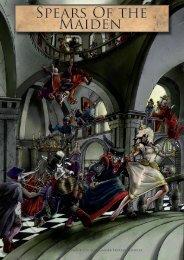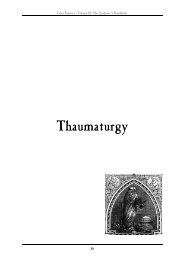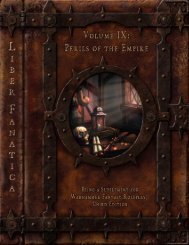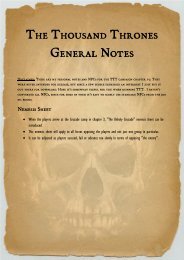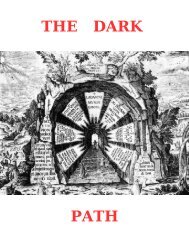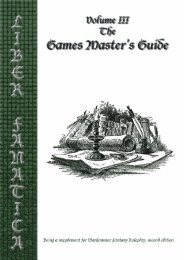992 KB Download - Liber Fanatica
992 KB Download - Liber Fanatica
992 KB Download - Liber Fanatica
You also want an ePaper? Increase the reach of your titles
YUMPU automatically turns print PDFs into web optimized ePapers that Google loves.
<strong>Liber</strong> <strong>Fanatica</strong> - Volume III : The Game Master’s Guideyou and others can easily read back over yourown work. I know at least a couple of people onthe relatively small board in which I roleplay whoavidly read roleplays they are not actuallyinvolved in, and budding GMs can often gainhelpful, constructive criticism from fellow GMsand players, since their work is open to all andeasy to read.Disadvantages of PBMBOf course, there are disadvantages: like PBEM,PBMB is significantly slower than real-timeroleplaying. My PBMB roleplays tend to lastaround a year (although I use quite sweepingstory arcs): this pales in contrast with the sevenyear “Fragile Alliances” mentioned earlier, butalso is extremely long compared to real-worldroleplaying, where even the most convoluted ofadventures will probably last less than half thattime. PBMB also has its own unique problem, inthat with impersonal, remote players, activity ismuch harder to control: chivvying via personalmessage and out-of-character discussion is allthat is achievable, and people can drop out orlose interest without a great degree of warning. Iftheir computers crash, players will be unable tocommunicate with the GM, even to say how longthey’ll be absent for; players could even be rundown in the street outside their home and you’dnever know, save that they stopped posting. Amillion and one personal circumstances can slowdown post rates and pull players out of the gamealtogether with minimal notice: thus PBMBgames suffer from the two flaws of inactivity,where post rates decline at an exponential rate asother people see the roleplay as ‘dead’ when thefirst slowdown begins and slow down themselves,and autopiloted characters, where players onholidays or with intervening personalcircumstances voluntarily or through necessityhave their PCs put under the control of the GMuntil the player can return or the PC can bequietly disposed of.Another, less important but noticeable blight onPBMB is quality of roleplaying: while those whoinvite/persuade their groups will usually have arelatively good idea of the roleplaying capacitiesof the people they ask, you cannot control whoapplies. Those who already use message boardswill be all too aware that many people on boardspost in a manner somewhat like this:“i think yu shud drop teh unit of pikemen, cos idont think that iz gud in a dow army. but thendow suxx, buy CHAOS WARRIORS khornROXXORZZ!!!!!!!!!!!”A note on language in PBMBEven worse is the dreaded “l33t sp34k”, wherebad posters seem to revel in just how horriblythey can abuse the English language by insertingabsolutely unnecessary abbreviations (3s for Es,4s for As, u for “you”, 4 for “for”, and so forth) atevery possible opportunity, generally spraying agenerous helping of gurning emoticons into theirtext to break it down into inane expressions incase you find their chunks of unpunctuated(…save for the occasional horde of exclamationmarks) code incomprehensible. These are peopleyou do not want in your roleplay. You don’t wantto make them angry or upset, but it’s best tointroduce some sort of quality control: as Imentioned earlier, you will probably receive moreapplications than you have space to use,especially if your roleplays turn out to bepopular. I myself use a “marking sheet,” whichevaluates the originality, realistic-ness andgeneral quality of character background andassigns a quantitative value by which characterentries can be compared: by releasing the marksonly privately and by request, and offering adviceand pointers on where those who missed being inthe roleplay lost ‘marks’, you can make sure thatthe process of selection and rejection is asfriendly and civil as possible. It is important,however, to remember that many on the boardsmay not have English as a first language, andthat people will get irritated if you begin todevelop a set ‘clique’ of players to the exclusion ofeveryone else: if others drift away, you may,ironically, get stuck with that clique, even if someof them disappear/become inactive or the qualityof their roleplaying begins to degrade.Assorted AdviceSo, I hope I’ve outlined the pros and cons ofPBMB without making your eyes bleed from thereading so far; what remains is the how. Most ofthe stuff that has been or will be said aboutPBEM applies: you can’t break down decisionmakingas much due to time restraints, andminor railroading is necessary in places to keepthings going, especially if inactivity looms.Don’t trouble characters with tiny, irritatingdecisions that you know they’d take anyway: letthem do what they want when working on a lowlevel, and keep intervening tests to a minimum,since you want to keep the flow running.Similarly, I would advise that chopping upfights into more than one or two segmentscan be fatal: you will lose the sense of pace thatshould be instilled in good fight-writing, and youwill also make even the simplest encounters dragon for weeks. My standard practice is simply toobtain a plan/plans from the players before anencounter, generally with a time limit before I willinitiate it, and then run through the entire fightaccording to that/those plan/s. Should majornew developments arise, the fight can then bebroken off in mid-swing to allow a second roundof urgent decision-making, heightening thetension, but generally two segments is as muchas I would consider. After all, if you make yourencounters too tactical, your players may beginto see the game as more of a strategy exercisethan a roleplaying game, and treat it as such.82





